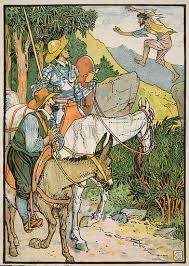Rafael Jesus Andino Librero ha compartido lapublicación de Literatura, Teatro Y Arte / Literature, Theatre and Art en el grupo Organización Mundial de Poetas, Escritores y Artistas.
1 min · CERVANTES VS SHAKESPEARE, "LA HISTORIA DE CARDENIO" / "THE HISTORY OF CARDENIO"Es importante señalar una nueva teoría que ha aparecido hace pocos años (desde el 2011 o así). Esta teoría establece que “LA HISTORIA DE CARDENIO” fue también escrita por William Shakespeare. Cardenio era un personaje creado por Miguel de Cervantes para “DON QUIJOTE”. “Don Quijote” fue traducido por vez primera al inglés por Thomas Shelton en 1612 (La primera parte de la novela había sido escrita ...Ver más
 Literatura, Teatro Y Arte / Literature, Theatre and Art ha añadido 2 fotos nuevas.CERVANTES VS SHAKESPEARE, "LA HISTORIA DE CARDENIO" / "THE HISTORY OF CARDENIO"Es importante señalar una nueva teoría que ha aparecido hace pocos años (desde el 2011 o así). Esta teoría establece que “LA HISTORIA DE CARDENIO” fue también escrita por William Shakespeare. Cardenio era un personaje creado por Miguel de Cervantes para “DON QUIJOTE”. “Don Quijote” fue traducido por vez primera al inglés por Thomas Shelton en 1612 (La primera parte de la novela había sido escrita en 1605, el original). Hoy en día se piensa que los Hombres del Rey representaron “LA HISTORIA DE CARDENIO” durante la época de Shakespeare.
Literatura, Teatro Y Arte / Literature, Theatre and Art ha añadido 2 fotos nuevas.CERVANTES VS SHAKESPEARE, "LA HISTORIA DE CARDENIO" / "THE HISTORY OF CARDENIO"Es importante señalar una nueva teoría que ha aparecido hace pocos años (desde el 2011 o así). Esta teoría establece que “LA HISTORIA DE CARDENIO” fue también escrita por William Shakespeare. Cardenio era un personaje creado por Miguel de Cervantes para “DON QUIJOTE”. “Don Quijote” fue traducido por vez primera al inglés por Thomas Shelton en 1612 (La primera parte de la novela había sido escrita en 1605, el original). Hoy en día se piensa que los Hombres del Rey representaron “LA HISTORIA DE CARDENIO” durante la época de Shakespeare.Un breve resumen de la historia sería el siguiente:
Cardenio se ha enamorado perdidamente de Lucinda, quien lo ama también. Pero él debe irse lejos porque debe atender un asunto militar. Fernando, amigo de Cardenio, se ha enamorado también de Lucinda, aunque Lucinda le rechaza. Fernando había violado a Dorotea. Dorotea amaba a Fernando. Al final Lucinda se queda con Cardenio y Fernando con Dorotea.
Leamos ahora un poema recitado por Cardenio en “Don Quijote”:¿Quién menoscaba mis bienes?
Desdenes.
Y ¿quién aumenta mis duelos?
Los celos.
Y ¿quién prueba mi paciencia?
Ausencia.
De ese modo, en mi dolencia
ningún remedio se alcanza,
pues me matan la esperanza
desdenes, celos y ausencia.¿Quién me causa este dolor?
Amor.
Y ¿quién mi gloria repugna?
Fortuna.
Y ¿quién consiente en mi duelo?
El cielo
De ese modo, yo recelo
morir deste mal estraño,
pues se aumentan en mi daño,
amor, fortuna y el cielo.¿Quién mejorará mi suerte?
La muerte.
Y el bien de amor, ¿quién le alcanza?
Mudanza.
Y sus males, ¿quién los cura?
Locura.
De ese modo, no es cordura
querer curar la pasión
cuando los remedios son
muerte, mudanza y locura.- - - - - - - - - - - - - - - - - - - - - - - - - - - - - - - - - - - - - - -"THE HISTORY OF CARDENIO" (Cervantes vs Shakespeare)It is important to point out a new theory that has appeared in recent years (since 2011 or so). This theory states that “THE HISTORY OF CARDENIO” was written by William Shakespeare too. Cardenio was a character created by Miguel de Cervantes for “DON QUIXOTE”. “Don Quixote” was translated into English by Thomas Shelton in 1612 (The first part of the novel had been written in 1605, the original). Nowadays it is thought that the King´s Men performed “THE HISTORY OF CARDENIO” during Shakespeare´s time.
A brief summary of the story would be as the following:
Cardenio has fallen in love with Lucinda, Lucinda loves him too. But he has to go away in order to deal with a military matter. Fernando, Cardenio´s friend, has fallen in love with Lucinda too, although Lucinda rejects him. Fernando had raped Dorotea. Dorotea loved Fernando. At the end Lucinda stays with Cardenio and Fernando stays with Dorotea.
Let´s read a poem recited by Cardenio in “Don Quixote”:What turns my happiness to pain?
Disdain.
And greater makes my woe for me?
Jealousy.
What sorest tries my patience?
Absence.
If that be so, then for my wrong
No remedy may I obtain,
Since my best hopes I find are slain
By disdain, jealousy, and absence long.Who through my breast this anguish drove?
Love.
Who doth my happiness abate?
Fate.
Who consents to this my pain?
Heaven.
If that be so, I fear “twill prove
That I must die In this sad plight,
Since for my overthrow unite
The heavens, fate, and love.Who can better hope bequeath?
Death.
What are the means to make me free?
Inconstancy.
And wherein lies the cure for sadness?
Madness.
If that be so, it´s merely silly
To seek my passion´s cure,
For there´s no remedy that´s sure
But death and change and folly.

